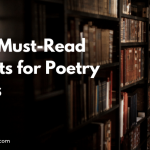Table of Contents
- 1. The Iliad by Homer
- 2. The Odyssey by Homer
- 3. The Divine Comedy by Dante Alighieri
- 4. Beowulf
- 5. Paradise Lost by John Milton
- 6. The Aeneid by Virgil
- 7. The Mahabharata
- FAQs
Epic poetry is an extraordinary genre that has captivated readers for centuries. These monumental works not only tell grand tales of heroism and adventure but also explore profound themes of existence, morality, and human nature. As we step into 2024, here are the top seven epic poetry books that deserve a spot on your reading list.
1. The Iliad by Homer
Overview: Written in the 8th century BC, “The Iliad” is a cornerstone of Western literature. It recounts the events of the Trojan War, focusing on the hero Achilles and his rage against Agamemnon.
Homer’s masterful use of language and his exploration of themes like honor, fate, and the human condition make this epic timeless.
Why Read It: The vivid descriptions and emotional depth will resonate with modern readers.
Visual Element:
| Themes | Description |
|---|---|
| Honor | The importance of personal and family honor |
| Fate | The inevitability of destiny |
| War | The realities and horrors of battle |
Learn More: Read more about The Iliad.
2. The Odyssey by Homer
Overview: Also penned by Homer, “The Odyssey” is a sequel to “The Iliad.” It follows the adventurous journey of Odysseus as he attempts to return home after the Trojan War.
This epic is not just about adventure; it delves into themes of loyalty, perseverance, and the quest for identity.
Why Read It: The character of Odysseus embodies the struggle of every individual seeking to find their way back home.
Visual Element:
| Character | Role |
|---|---|
| Odysseus | The clever hero seeking to return home |
| Penelope | The faithful wife waiting for Odysseus |
| Telemachus | The son who grows into manhood |
Learn More: Explore The Odyssey.
3. The Divine Comedy by Dante Alighieri
Overview: Written in the early 14th century, Dante’s “The Divine Comedy” is a profound allegorical poem that navigates through Hell, Purgatory, and Heaven.
Dante’s work merges philosophy, theology, and personal reflection, providing insight into medieval beliefs and the human soul’s journey toward God.
Why Read It: This makes it a must-read for anyone interested in spirituality and morality.
Visual Element:
| Sections | Description |
|---|---|
| Inferno | Exploration of sin and punishment |
| Purgatorio | The path of purification and redemption |
| Paradiso | The ultimate union with the divine |
Learn More: Discover The Divine Comedy
4. Beowulf
Overview: This Old English epic poem, composed between the 8th and 11th centuries, tells the story of the hero Beowulf, who battles the monster Grendel, Grendel’s mother, and a dragon.
“Beowulf” is not only a thrilling tale of heroism but also an exploration of the values of bravery, loyalty, and the inevitable decline of age.
Why Read It: Its use of alliteration and unique poetic structures makes it a fascinating read.
Visual Element:
| Key Elements | Description |
|---|---|
| Heroism | The valor and courage of Beowulf |
| Fate | The inescapability of death |
| Legacy | The importance of reputation and memory |
Learn More: Read more about Beowulf
5. Paradise Lost by John Milton
Overview: This 17th-century epic poem narrates the biblical story of the Fall of Man, focusing on the temptation of Adam and Eve by Satan.
Milton’s complex characterizations and rich language invite readers to ponder the nature of free will, obedience, and the consequences of defiance.
Why Read It: Its exploration of good versus evil remains relevant today.
Visual Element:
| Themes | Description |
|---|---|
| Free Will | The power of choice in human life |
| Obedience | The relationship between creator and creation |
| Redemption | The possibility of salvation |
Learn More: Explore Paradise Lost
6. The Aeneid by Virgil
Overview: Composed in the 1st century BC, “The Aeneid” tells the story of Aeneas, a Trojan hero destined to found Rome.
Virgil’s work is a celebration of duty and destiny, reflecting the Roman values of piety and perseverance.
Why Read It: It intertwines myth and history, making it a rich text for understanding Roman culture.
Visual Element:
| Key Characters | Role |
|---|---|
| Aeneas | The Trojan hero and protagonist |
| Dido | The queen of Carthage and tragic figure |
| Turnus | The antagonist representing opposition |
Learn More: Discover The Aeneid
7. The Mahabharata
Overview: This ancient Indian epic is one of the longest poems in the world, detailing the Kurukshetra War and the fates of the Kaurava and Pandava princes.
“The Mahabharata” encompasses a wealth of philosophy, ethics, and spirituality, resonating across cultures and time.
Why Read It: Its teachings on dharma (duty/righteousness) and the complexities of human relationships are profound.
Visual Element:
| Major Themes | Description |
|---|---|
| Dharma | The principle of cosmic order and duty |
| War | The moral dilemmas faced in conflict |
| Devotion | The relationships between gods and humans |
Learn More: Read about The Mahabharata.
Also Look For
If you enjoy epic poetry, consider exploring other classic literature. For example, you might appreciate our list of Top 7 Ancient Classics Everyone Should Read Today. Each of these works has shaped literary traditions and continues to resonate with readers today.
FAQs
Q: What is epic poetry?
A: Epic poetry is a lengthy narrative poem that typically details heroic deeds and events significant to a culture or nation. It often includes grand themes, elevated language, and larger-than-life characters.
Q: Why should I read epic poetry?
A: Reading epic poetry enriches your understanding of cultural narratives, historical contexts, and timeless human experiences. It also enhances your appreciation for literary artistry.
Q: Are there modern epic poems?
A: Yes! While traditional epics are ancient, contemporary poets continue to experiment with the epic form, reflecting modern themes and issues. Works by poets like Derek Walcott and others can be considered modern epics.
Q: Where can I find these books?
A: Most of these epic poems are available in bookstores, libraries, and online platforms like Project Gutenberg or Internet Archive.
Dive into these epic poems in 2024, and let their timeless stories inspire your journey through the world of literature! Happy reading!



